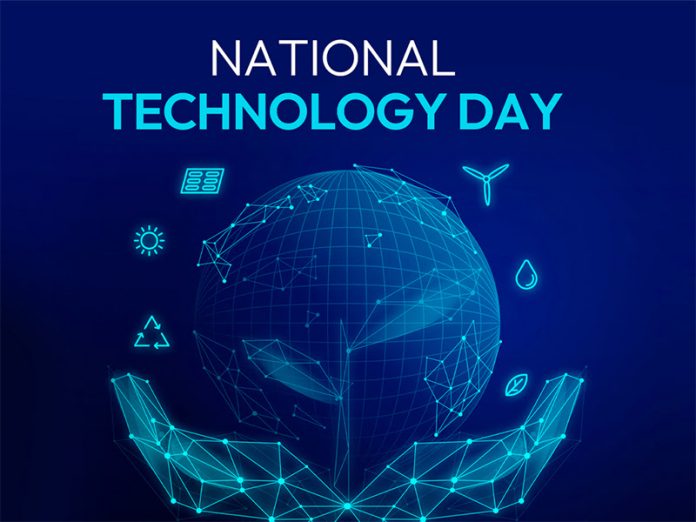India celebrated its first National Technology Day on May 11, 1999, after the successful nuclear test at Pokhran in 1998, to commemorate the many achievements of the Indian scientific and technology fraternity. This day serves as a testament to India’s constant and relentless pursuit of excellence and innovation. It is an opportunity to celebrate and honor the collaborative efforts of scientists, engineers, entrepreneurs, and educators, towards building a better, more efficient, and supportive innovation ecosystem.
It goes without saying that behind every technological breakthrough are countless individuals and organizations working tirelessly to break the glass ceiling and achieve the unfathomable. Hence, National Technology Day reminds the Indian community to keep investing in research and development, further cementing a culture of science and innovation while ensuring equitable access to technology for all.
India’s Story in Building a Strategic Scientific and Technology Forum
The journey of technology and innovation has been nothing short of exceptional for India. The nation has been a treasure trove of knowledge from the very start of civilization. With a rich scientific heritage dating back thousands of years, India, to begin with, has made significant contributions including the concept of zero, the formulation of algebra and trigonometry, and the decimal system. Aryabhatta is considered to be a major early physicist and a mathematician who explicitly developed theories on the motion of planets.
Indian scientific community has made great advancements in the fields of medicine, astronomy, engineering, space, biotechnology, renewable energy, electronics, automotive, and defence. The government has put sincere efforts into establishing refined, top-notch, and highly competitive educational facilities like the Indian Institute of Technology (IITs) and Indian Institutes of Science (IISc) among others. Also, to bolster the R&D ecosystem in the country, institutions like the Council of Scientific and Industrial Research (CSIR) and the Indian Space Research Organization (ISRO) have been established.
The Indian IT industry is booming to become a global hub with MNCs like Tata Consultancy Services, Wipro, and Infosys playing a crucial role in accelerating the nation’s economic growth. The Space program has achieved significant milestones, including the launch of satellites, lunar exploration missions (Chandrayaan-1 and Chandrayaan-2), and Mars exploration (Mangalyaan).
The story doesn’t end here; India is also among the top players in biotechnology and pharmaceuticals, with rapid development in areas like vaccine development, generic drug manufacturing, and biotech research. Also, the country is investing hugely in renewable energy stressing on adopting environment-friendly ways and technology in the long run.
How far has India Come?
India in the last decade has seen major strides in the field of science and technology on a global level. Initiatives like “Make in India” launched by the GoI in 2014 aim at transforming the nation into a global manufacturing hub by attracting foreign investments, improving the ease of doing business, and promoting skill development, to revitalize the manufacturing sector and promote economic growth and job creation in the country. “Digital India” is another initiative launched with the vision of transforming India into a digitally-enabled and empowered society. It aims at leveraging digital technologies to bridge the digital divide and promote growth and development in varied sectors like electronics, automotive, IT, transportation, and communication.
With such initiatives being actively worked upon, India has been hit by the wave of startup culture. The EV sector is ramping up with denser infra being set up across the country. Technology leaders like Tesla and TATA are making their way in the EV segment in India. The country is boosting its semiconductor business with GoI investing bulk in setting up manufacturing units. We also saw mobile phone manufacturing jump 21 times to nearly Rs. 4.1 lakh Cr in the last 10 years.
Industry Speaks:
Read with us what top thought leaders have to say as we observe National Technology Day this year.
Mr. Aalok Kumar, Corporate Officer & Sr. VP – Head of the Global Smart City Business at NEC Corporation and President & CEO at NEC Corporation India
“Over the past decade, India has matured into global leadership in technological innovation. This has altered how we experience how the day-to-day services are provided and above all, how citizens utilize civic services. This transformation is fundamentally underpinned by the recognition of technology’s potential to change lives and communities for the better. Today, India is on a steady path to realizing its vision for a ‘Viksit Bharat’ by 2047, and the role of technology comes into sharp focus with greater responsibility than ever before. At this juncture, the tech innovation ethos in India is evolving to “purposeful innovation” aimed at societal good, demanding creative and responsible application of AI, ML, and big data analytics to solve day-to-day problems of the common man.
At NEC India, our purpose is to build technology that serves the people, and as intelligent communities emerge, driven by data analytics and AI, we are proud to be playing our part in shaping a future where technology redefines citizen-centricity in civic services empowering lives. India’s unique position as a rapidly urbanizing nation undergoing large-scale digital transformation presents an unparalleled opportunity as a testing ground for innovative solutions that can be adapted to various markets worldwide.”
Mr. Sivakumar Selva Ganapathy, Vice President at OpenBlue India Software Engineering & APAC Solutions, Johnson Controls
“This year, India celebrates the 25th anniversary of National Technology Day. As we reflect on this journey, it is evident that our progress over the past two decades has been nothing short of remarkable. From our early achievements to emerging as a global technological hub today, India’s strength and capability in the domain speaks for itself.
While technology has impacted every sector in India, one area where it is poised to make a defining impact is sustainability. From building management systems analyzing occupancy patterns to AI-powered Smart grids optimizing energy distribution, technology is actively transforming cities into efficient and sustainable hubs. As a corollary, the area of green technology and green buildings is increasingly becoming more relevant, and as it continues to evolve, skilling & curriculum development assumes added importance. It is our firm belief that this can be best achieved through industry-academia collaboration.
At Johnson Controls India, we are observing a steady increase in the adoption of technologies for green buildings, and it won’t be long before buildings evolve from merely being smart, to autonomous – capable of governing and maintaining itself! This National Technology Day, as we look at the strides made, we also look forward to witnessing the future of green technologies unfold, and renew our commitment to innovating for a green tomorrow. “
The Way Forward for India
 India holds tremendous potential for innovation and collaboration in varied sectors including healthcare, education, transportation, and communication, where technology has permeated and unlocked new opportunities for growth and development.
India holds tremendous potential for innovation and collaboration in varied sectors including healthcare, education, transportation, and communication, where technology has permeated and unlocked new opportunities for growth and development.
National Technology Day is not merely about gadgets and gizmos but holds a more profound implication on how technology has impacted our society for the better. Technology has the power to democratize access to information, improve healthcare systems, enhance education, foster economic development, and promote sustainable development.
As we commemorate this day in 2024, let us look at the future with optimism and resolve and reaffirm our commitment to leverage the power of technology responsibly and ethically, to create a more inclusive and sustainable world.










